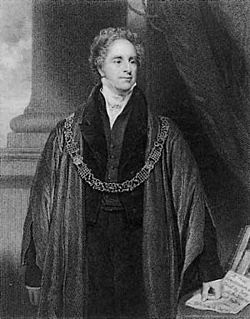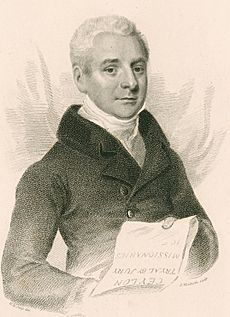Alexander Johnston (1775–1849) facts for kids
Quick facts for kids
Sir
Alexander Johnston
|
|
|---|---|
 |
|
| 3rd Chief Justice of Ceylon | |
| In office 6 November 1811 – 1819 |
|
| Preceded by | William Coke As Acting |
| Succeeded by | Ambrose Hardinge Giffard |
| Puisne Justice of the Supreme Court of Ceylon | |
| In office 1807–1811 |
|
| Acting Chief Justice of Ceylon | |
| In office 3 April 1806 – 5 April 1807 |
|
| Preceded by | Codrington Edmund Carrington |
| Succeeded by | Edmund Henry Lushington As Acting |
| 2nd Advocate Fiscal of Ceylon | |
| In office 7 August 1802 – 1806 |
|
| Preceded by | James Dunkin |
| Succeeded by | James Dunkin |
| Personal details | |
| Born | Carnsalloch, Dumfriesshire, Scotland |
| Died | 6 March 1849 London, United Kingdom |
| Nationality | British |
| Occupation | British privy councillor, founder and vice-president of the Royal Asiatic Society, lawyer, colonial official |
| Known for | being the Chief Justice of Ceylon and founder of Royal Asiatic Society |
Sir Alexander Johnston (who passed away on March 6, 1849) was an important British official. He served as the third Chief Justice of Ceylon (which is now Sri Lanka). He also held the position of second Advocate Fiscal of Ceylon, which was like a top legal advisor.
Johnston made many important changes in Sri Lanka. He brought in new ideas that helped people and supported the rights of the local people. He was also very interested in Eastern cultures and languages. He helped start the Royal Asiatic Society of Great Britain and Ireland, a group dedicated to studying Asia.
Early Life and Education
Alexander Johnston was born in a place called Carnsalloch in Scotland. His parents were Samuel Johnston and Hester Napier. When he was young, his family moved to India because his father got a job there.
In India, Alexander learned from a missionary named Christian Friedrich Schwarz and also from Sir Thomas Munro. Because of this, he learned to speak several Indian languages like Tamil, Telugu, and Hindustani language from a young age.
Career in Ceylon
When Alexander was eleven, he had the chance to join the army, but he decided to study law instead. He studied law in Germany and then in England.
In 1799, he moved to Ceylon (now Sri Lanka) and became the Advocate General. This was a very important legal job. In 1805, he became a Chief Justice. He was asked to suggest ways to improve how Ceylon was run. Many of his ideas were later used in official rules for the East India Company in 1813. He was given the title "Sir" in 1811.
Johnston played a big part in sharing Sri Lanka's history with Europe. He sent copies of the Mahavamsa, a famous historical book from Sri Lanka, to Europe so it could be published. He wanted British laws to work better with the local traditions and beliefs.
Sir Alexander Johnston made many important changes in Ceylon. These included:
- Making sure everyone could get an education.
- Allowing people to practice any religion they chose.
- Ending slavery.
- Hiring local people for government jobs.
- Writing down laws that included the traditional ideas of Hindus, Muslims, and Buddhists.
Johnston returned to England in 1819 after his work in Ceylon.
Later Life and Legacy
After he retired, Sir Alexander Johnston helped create the Royal Asiatic Society. This society is still active today and focuses on studying the history, culture, and languages of Asia. He passed away in London on March 6, 1849.
Personal Life
Sir Alexander Johnston had a son named Alexander Robert Johnston. His son also became a colonial official, working in places like Mauritius and Hong Kong.
 | Chris Smalls |
 | Fred Hampton |
 | Ralph Abernathy |


